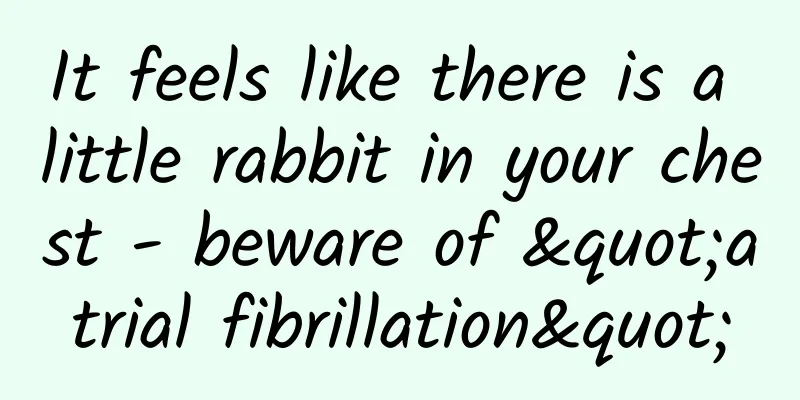It feels like there is a little rabbit in your chest - beware of "atrial fibrillation"

|
Author: Liu Xingpeng, Chief Physician, Beijing Chaoyang Hospital, Capital Medical University Reviewer: Zhang Yu, researcher at Chinese Center for Disease Control and Prevention Emotional excitement, anxiety, tension, strenuous exercise... In our daily lives, there are many factors that may cause the heartbeat to accelerate and cause palpitations. However, if palpitations occur without a clear cause, we have to consider heart-related diseases, such as atrial fibrillation. 1. What is atrial fibrillation? Atrial fibrillation is a type of cardiac arrhythmia, or simply a disorder of the heartbeat. Our heart is similar to a two-bedroom, two-living room house, with two ventricles and two atria. The ventricle is equivalent to a heart pump, it pumps blood out, while the atrium absorbs blood from other parts of the body back to the heart. Figure 1 Original copyright image, no permission to reprint Atrial fibrillation is a heart rhythm disorder that occurs in the atria. Under normal circumstances, the heart is controlled by a headquarters. During atrial fibrillation, this headquarters loses its ability to work. We can understand it as some "rebel troops" in the atrium taking over the entire atrium, causing the heart to beat randomly, so the beating frequency will be very fast, usually between one hundred and two hundred times. This disease is very common, with a prevalence rate of about 1% among all adults, but it is closely related to age and is particularly common among the elderly. Studies have reported that the prevalence rate among the elderly over 75 years old is about 10%; among the elderly over 80 years old, the prevalence rate is about 20%. Therefore, it is a very common disease that can cause many uncomfortable symptoms and is very harmful. It is a relatively serious and complex arrhythmia. 2. What symptoms should alert you to the occurrence of atrial fibrillation? The symptoms of atrial fibrillation vary greatly from person to person. Different patients with atrial fibrillation have different symptoms. Some patients have very severe symptoms, while others have no obvious symptoms. But the most common symptoms are probably as follows: The first symptom is panic. As we mentioned earlier, during atrial fibrillation, the heart rate is usually between 100 and 200 times, so the patient will feel panic. Sometimes, the patient does not have a clear feeling of panic, but feels particularly uncomfortable in the chest, as if there is a little rabbit in this place. Some patients also describe that they feel a vague feeling of uneasiness in their hearts. This is a large group of symptoms. The second symptom is fatigue. We know that all kinds of activities throughout the body, including mental and physical activities, require the heart to pump blood, and the heart's blood pumping is a very important source of energy for our body. Once atrial fibrillation occurs, the heart's ability to pump blood will be reduced by 25%, which means that 1/4 of the blood cannot be pumped out. At this time, if we need to do some activities, without sufficient blood supply, we will feel weak, especially when lifting heavy objects and other physical activities, the fatigue will be obvious. This is also a large group of symptoms. There is also a third group of symptoms, that is, the patient already has other heart diseases, such as angina pectoris, heart failure. Once atrial fibrillation occurs, the original heart disease symptoms will be further aggravated, which is like adding insult to injury. For example, angina pectoris, which was originally well controlled by drugs, will cause frequent attacks if atrial fibrillation occurs. Every time an attack occurs, the patient will feel a pain in the chest like a knife cutting. So this is also a large group of symptoms. Figure 2 Original copyright image, no permission to reprint There are also quite a number of patients, especially some elderly people, who do not feel anything. They discover atrial fibrillation during physical examinations, or when they measure their blood pressure at home, they find that the blood pressure monitor shows irregular pulse beats. When they do an electrocardiogram, they find that it is atrial fibrillation. Therefore, the symptoms of patients with atrial fibrillation vary greatly. 3. Is medication effective for patients with atrial fibrillation? Because the most obvious harm of atrial fibrillation is that it can easily lead to stroke, the first treatment for atrial fibrillation is to prevent stroke. In addition, from a doctor's point of view, it would be best if the atrial fibrillation can be converted to a normal heartbeat. However, some patients are very complicated, and medicine has its own limitations. If it is difficult for us to convert it to a normal heartbeat, we must actively control the patient's symptoms. Therefore, the treatment of atrial fibrillation can be roughly divided into three aspects: preventing stroke, converting atrial fibrillation, and controlling symptoms. The corresponding three types of drugs are also very important in the treatment of atrial fibrillation. The first type of drugs is the most important, which are anticoagulants. When atrial fibrillation occurs, it is easy for blood clots to form in the auricle. If the blood clots break off, they can easily reach the brain along the blood vessels, causing a stroke. Therefore, the role of anticoagulants can be simply understood as preventing blood from clotting, thereby preventing blood clots and thus preventing stroke. The second largest category of drugs is those that convert atrial fibrillation into normal heartbeat. The third category of drugs is those that slow down the heart rate, making the heart beat slower and making the patient feel more comfortable. Frankly speaking, drugs for treating atrial fibrillation are either ineffective or have some relatively serious side effects, so we are sometimes reluctant to use these drugs. Moreover, it is very difficult to use drugs to convert atrial fibrillation into a normal heartbeat or prevent it from happening forever. Therefore, surgery to prevent stroke and even cure atrial fibrillation is a very important treatment method. Of course, specific surgical methods, for example, if we want to cure atrial fibrillation, can be divided into many types, such as radiofrequency ablation, surgical methods, hybrid surgery, etc. In short, the specific surgical method should be selected according to different atrial fibrillation conditions. |
Recommend
What should I do if I feel stinging when urinating after childbirth?
Many mothers have a very hard time giving birth. ...
What does a comprehensive gynecological examination include?
Women must actively cooperate when undergoing phy...
A woman dreams of her child
Giving birth to a child is something that a woman...
How to identify the unfamiliar yet common pulmonary arterial hypertension?
Today is May 5th and is also the 12th "Inter...
This thing has become very popular recently! If your child is playing it, please stop it immediately!
Among primary school students everywhere, a more ...
The most obvious signs of pregnancy
In the early stages of pregnancy, the symptoms ar...
Lupus is not a myth! Learn how this 'immortal cancer' quietly invades the body!
Lupus, nicknamed "immortal cancer", lea...
What should I do if I have been to Wuhan recently? Will I be infected with pneumonia if I go to Wuhan?
Recently, the news of the unknown pneumonia in Wu...
What causes hair loss after miscarriage?
When a woman suffers an unexpected miscarriage du...
Is it normal to have menstruation during breastfeeding?
It is normal not to have menstruation during brea...
Why do I have diarrhea during my period?
In addition to dysmenorrhea, most women also expe...
What to do if your breasts swell after exercise
Breast diseases are currently a common disease. G...
Menstrual safety period calculator table_Menstrual safety period calculator
As we all know, there is a period of safe menstru...
Myocardial infarction at the age of 41, due to metabolic syndrome! Heart disease risk is 5 times higher! Stroke risk is 16 times higher
On July 21, a 41-year-old male patient was rescue...
I keep wanting to pee, is it because I am about to give birth?
During pregnancy, many pregnant women always want...









